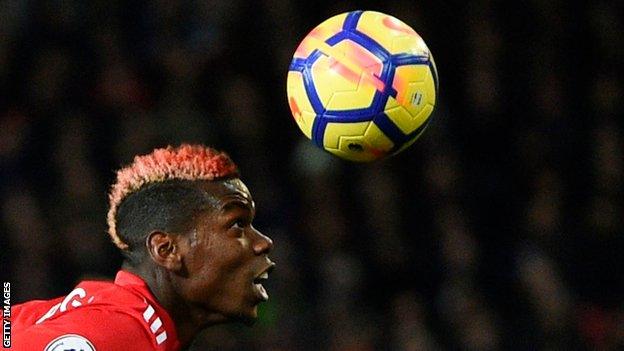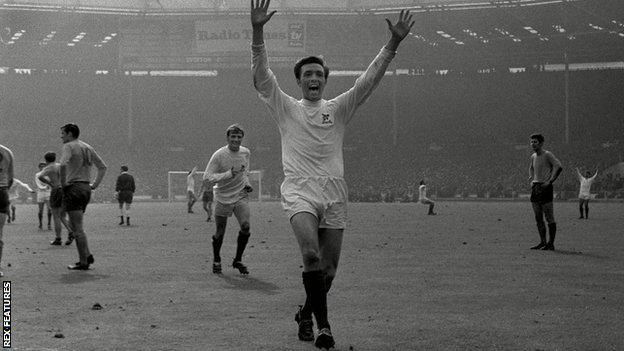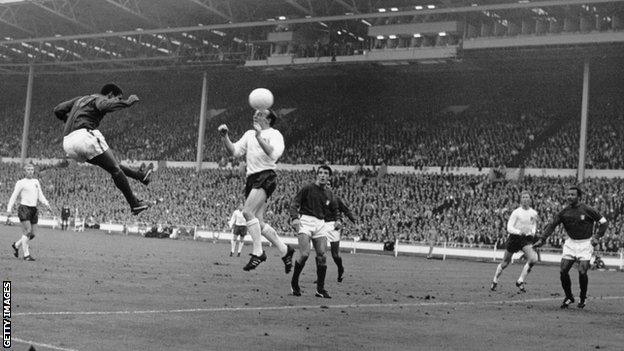Brain injury expert calls for ban on heading in football
- Published
- comments

Dr Bennet Omalu, one of the world's leading experts on brain injuries, believes heading is "dangerous" and "does not make sense"
Heading a football should be restricted in the professional game and banned for those under the age of 18, according to one of the world's leading experts on brain injuries.
Dr Bennet Omalu discovered the brain disease chronic traumatic encephalopathy (CTE).
The condition has long-term effects and is caused by repeated head trauma.
"It does not make sense to control an object travelling at a high velocity with your head," Dr Omalu said.
"I believe, eventually, at the professional level we need to restrict heading of the ball. It is dangerous."
Speaking to BBC Radio 5 live's Phil Williams programme, Omalu added: "No child under the age of 18 should be heading the ball in soccer.
"Kids under the age of 12 to 14 should play a less contact form of soccer which we should develop for them. Kids between 12 and 18 can play but should not head the ball.
"I know this is difficult for many people but science evolves. We change with time. Society changes. It is time for us to change some of our ways."
An inquest into the death of former England and West Brom footballer Jeff Astle ruled he died from brain trauma caused by heading heavy leather footballs.
He died in 2002, aged 59, after suffering with Alzheimer's for almost 10 years following his 18-year football career.
On Wednesday, his daughter Dawn repeated calls for the game to investigate possible links between CTE and the heading of footballs.
"This is fact now. We are not just assuming other players may have died of the same illness as Dad, this is now fact," said Dawn.
Her latest comments come after the death of Rod Taylor, a former wing-half for Portsmouth, Gillingham and Bournemouth, who died in April having suffered from the condition.
His daughter Rachel Walden told the BBC heading the ball should not be banned but instead the Professional Footballers' Association (PFA) and the Football Association (FA) should to do more to help support former players and their families.
"My father's dementia was caused by heading the ball and concussions," she said. "We can't wait for them to die before we start helping them. We need to start helping them now.
"We are not blaming the football clubs or the clubs that he played for. He was proud of all the clubs he played for. It's not about changing the game, it's about trying to get the PFA to take responsibility for their members in their hour of need."

An inquest into the death of famed England and West Bromwich Albion striker Jeff Astle ruled he died from brain trauma caused by heading heavy leather footballs
Several high-profile ex-players have been diagnosed with dementia, including 1966 England World Cup winners Nobby Stiles, Martin Peters and Ray Wilson, Liverpool legends Ron Yeats and Tommy Smith and Celtic's European Cup-winning captain Billy McNeill.
Speaking about the effect heading a football has on the head, Omalu said: "The human brain floats like a balloon inside your skull so when you head the ball you suffer brain damage. You damage your brain when you head the ball.
"Playing soccer would increase your risk of suffering brain damage when you are much older and developing dementia and CTE."
There have been a number of moves across professional sport to combat head injuries.
Concussion substitutes have been introduced to county cricket this summer, allowing teams to replace a player who has concussion or suspected concussion, while rugby union chiefs introduced an eight-point action plan in March to make the sport safer.

1966 England World Cup winner Nobby Stiles has endured a 15-year battle with Alzheimer’s and vascular dementia